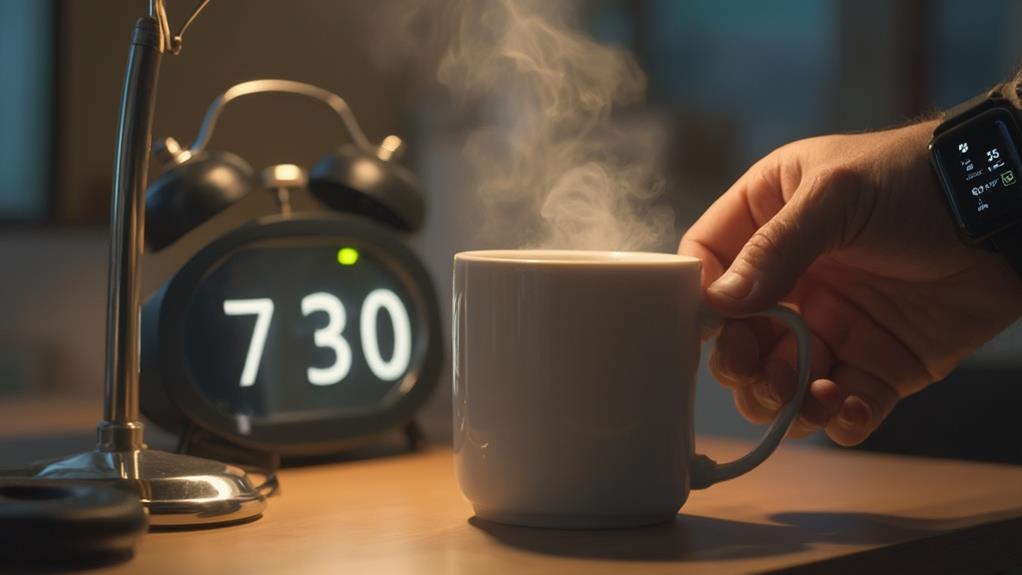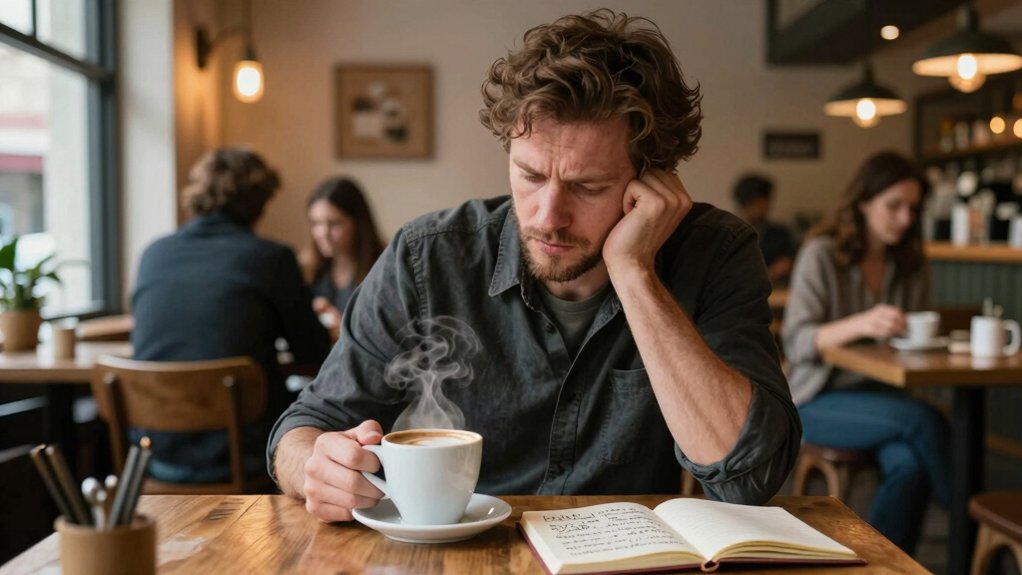Have you ever wondered why your morning coffee doesn’t always hit the spot at the same time? I’ve definitely pondered this question, especially on those days when I’m desperately waiting for that caffeine lift to kick in. As it turns out, the timing of coffee’s effects isn’t as straightforward as we might think. From metabolism to hydration, numerous factors play a role in determining when and how intensely we feel that beloved coffee buzz. Understanding these variables can make a world of difference in how we approach our daily brew. So, what’s really going on behind the scenes when we take that first sip?
Table of Contents
The Coffee Kick: What’s the Timeline?
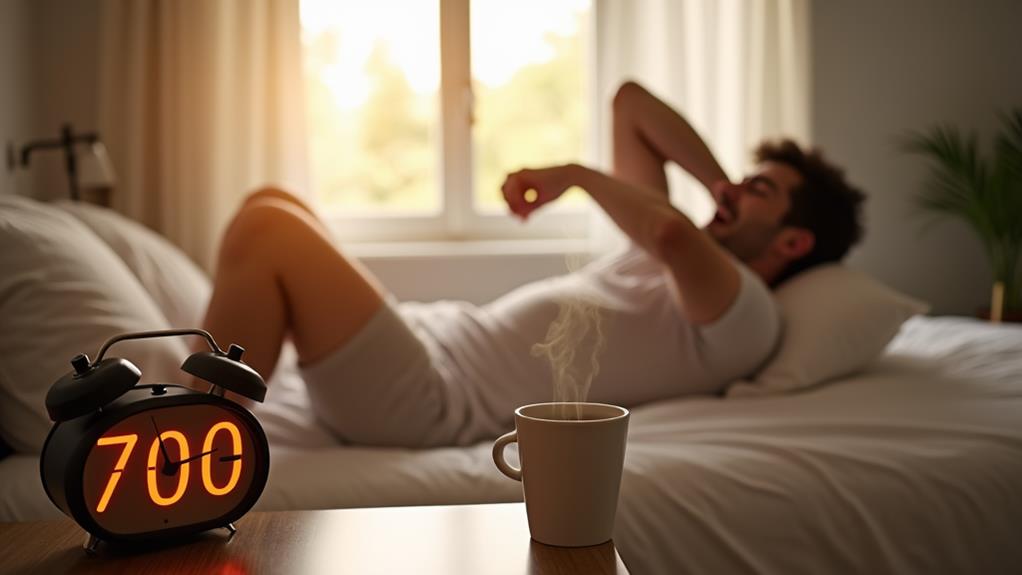
Most coffee drinkers enthusiastically await that energizing kick after their first sip, but the timeline isn’t as instantaneous as you might think.
As a coffee expert, I’ve learned that the progression from caffeine to kick is a bit more complex.
Here’s the scoop: You’ll start feeling the effects within about 15 minutes. That’s when the caffeine begins to work its magic on your brain.
But hold your horses – the full impact won’t hit for another 30 to 60 minutes. That’s when you’ll really feel that coffee buzz.
Now, don’t expect the same results every time. Your body’s unique, and factors like what you’ve eaten can change how quickly the caffeine hits.
Here’s a pro tip: Time your coffee right. Drinking it in the morning syncs with your natural cortisol levels, giving you the best enhancement.
Remember, caffeine’s half-life is 3 to 7 hours. So that afternoon cup might keep you wired well into the evening.
Want to optimize your coffee kick? Pay attention to when you drink and how your body responds. It’s all about finding your personal sweet spot.
When Will I Feel the Effects?
You’ll start feeling that coffee buzz pretty quickly.
Within 15 minutes, you might notice a little pep in your step, but the real magic happens around 30-60 minutes when caffeine levels peak in your bloodstream.
And don’t worry if you’re still wired hours later – caffeine can stick around for quite a while, keeping you alert long after that last sip.
Initial impact
You’ll typically start feeling coffee’s effects within 15 to 45 minutes after drinking it.
Some people might notice an increase in as little as 10 minutes.
However, individual responses vary widely.
Peak caffeine levels hit your bloodstream around 30 to 60 minutes post-consumption, giving you the maximum energy enhancement.
For a few, it might take up to 2 hours to feel fully caffeinated.
Peak concentration
You’ll typically start feeling coffee’s effects within 15 to 45 minutes after drinking it.
Some people report a buzz as soon as 10 minutes in.
Peak caffeine concentration in your blood occurs around 30 to 60 minutes post-consumption.
Factors like your metabolism, whether you’ve eaten, and how often you drink coffee can influence timing.
Liquid caffeine generally acts faster than solid forms.
Duration of effects
You’ll typically feel coffee’s effects within 15-45 minutes, peaking around 30-60 minutes after drinking.
Some might feel it in just 10 minutes, while others could take up to 2 hours.
The buzz can last 3-7 hours, depending on factors like metabolism and coffee strength.
Liquid caffeine, like coffee, usually kicks in faster than solid forms.
What Affects Caffeine Absorption?
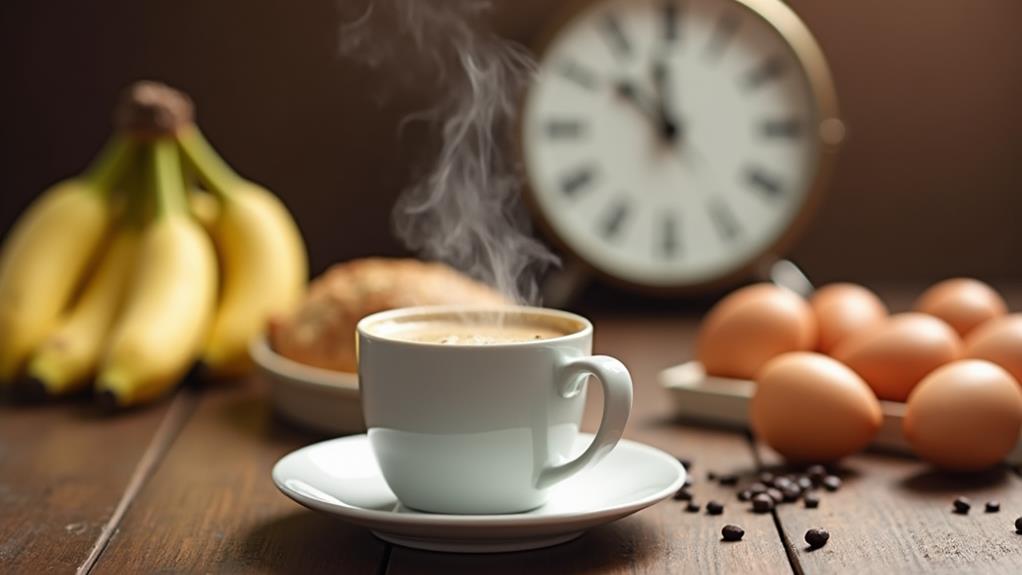
Let’s talk about what affects how quickly your coffee hits you.
Your metabolism, how often you drink coffee, what you eat, and even the type of caffeine you consume all play a role.
I’ll break down each of these factors so you can understand why your morning brew might kick in faster (or slower) than your coworker’s.
Individual metabolism
Caffeine absorption varies widely due to individual metabolism.
Factors like genetics, body weight, and regular caffeine use affect how quickly you feel coffee’s effects. Some people may experience an increase within 15 minutes, while others might wait up to 2 hours.
Age, medications, and health conditions can also influence caffeine sensitivity. The strength and amount of coffee consumed play a role too.
Frequency of consumption
Regular coffee drinkers often develop tolerance, needing more caffeine for the same effects.
How often you consume coffee impacts its kick-in time. If you’re a daily drinker, you mightn’t feel the buzz as quickly or intensely as occasional users.
Your body adapts to frequent caffeine intake, potentially leading to a slower onset of effects.
Diet and lifestyle
Diet and lifestyle play a big role in how quickly coffee kicks in.
Eating food can slow down caffeine absorption, while staying hydrated may speed it up. Your metabolism, genetics, and body weight also matter.
Regular coffee drinkers mightn’t feel the effects as strongly. Active people tend to process caffeine faster.
Liquid caffeine works quicker than solid forms, so coffee hits faster than chocolate.
Form of caffeine
Caffeine absorption varies depending on its form. Liquid caffeine, like in coffee, kicks in faster—usually within 15 minutes. Solid forms take longer. Peak levels hit 30-60 minutes after ingestion.
Other factors affecting absorption include:
- Food in your stomach
- Individual metabolism
- Genetics
- Body weight
- Regular caffeine use
- Hydration status
These all play a role in how quickly you feel caffeine’s effects.
How Much Caffeine Is in My Cup?
Let’s talk about how much caffeine is actually in your cup.
I’ll break down the caffeine content in different coffee types, but don’t forget about other sources like energy drinks, tea, and even chocolate.
Knowing your caffeine intake is key to understanding how it’ll affect you.
Coffee types
Your coffee’s caffeine content varies widely depending on the type and preparation.
A regular 8-ounce cup of brewed coffee contains 80-100 mg, while espresso packs 63 mg in just one ounce.
Cold brew offers a higher kick at 200 mg per 8 ounces.
Instant coffee ranges from 30-90 mg, and specialty drinks can exceed 300 mg per serving.
Choose wisely for your desired caffeine enhancement!
Energy drinks
Energy drinks pack a serious caffeine punch, typically containing 80-300 mg per serving. A standard 8-ounce serving usually has about 100 mg, but it varies by brand.
Watch out for added stimulants like guarana and taurine, which can intensify caffeine’s effects. These drinks work fast, hitting you within 10-15 minutes.
Always check the label – some cans contain multiple servings, risking caffeine overload if you chug the whole thing.
Tea and chocolate
While coffee’s caffeine hits quickly, tea and chocolate offer a more gradual buzz.
Black tea packs 30-50mg per cup, green tea 20-45mg, and matcha a whopping 70mg per gram.
Dark chocolate contains 50-90mg per 100g, while milk chocolate has less.
The caffeine in tea takes longer to kick in due to L-theanine’s calming effect.
Always check labels for accurate caffeine content.
Can I Speed Up or Slow Down the Process?
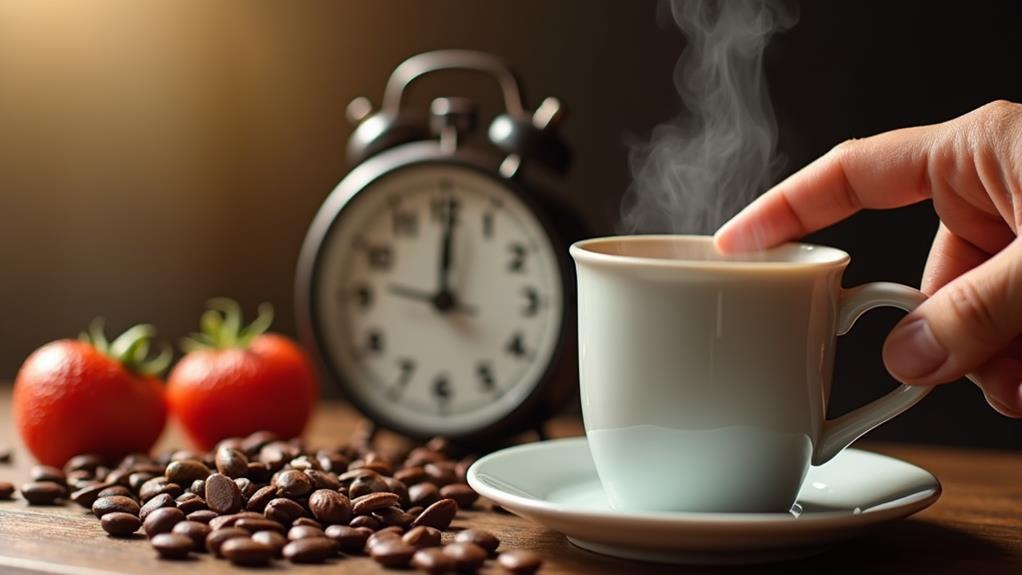
Many people wonder if they can manipulate how quickly caffeine affects their system or how long its effects last. The truth is, there’s no magic trick to speed up or slow down caffeine’s impact.
How long does it take for caffeine to kick in? Typically about 45 minutes, but everyone’s different.
While you can’t change the process, you can optimize your caffeine experience:
- Pair with food: Eating while you sip can slow absorption, reducing jitters.
- Stay hydrated: Water won’t speed things up, but it’ll help manage side effects.
- Light exercise: A quick walk can enhance alertness without changing absorption.
- Know your body: Experiment with timing to find what works best for you.
Are There Health Implications?
As a coffee expert, I’ve seen both benefits and risks when it comes to our beloved brew.
Moderate caffeine intake can enhance your health, but overdoing it might leave you jittery and sleepless.
I always recommend sticking to 200-400 mg of caffeine daily for most adults, but pregnant folks should cap it at 200 mg to play it safe.
Benefits
Moderate caffeine intake offers several health benefits, including reduced risks of Parkinson’s and Alzheimer’s, improved cognitive function, and improved physical performance.
It’s a popular pre-workout lift for athletes. However, moderation is key, as high consumption can lead to negative side effects.
Pregnant individuals should limit intake, and regular users may experience withdrawal symptoms if they stop abruptly.
Potential risks
While coffee can provide a quick energy lift, excessive caffeine intake comes with risks.
Anxiety, insomnia, and heart palpitations can occur within hours. Long-term heavy use may lead to dependency and withdrawal symptoms.
Pregnant individuals should limit intake, and habitual drinkers may experience diminished effects over time.
High consumption, especially from energy drinks, raises concerns about heart health.
Recommended intake
Moderate caffeine intake (200-400 mg daily) offers health benefits, but pregnant individuals should limit to 200 mg.
Excessive consumption can cause anxiety and insomnia. Regular users may develop tolerance and dependency.
Caffeine’s half-life varies, so understanding your metabolism is key.
To manage intake effectively, consider your health status and consumption habits when deciding how much coffee to drink.
How Does Coffee Compare to Other Caffeine Sources?
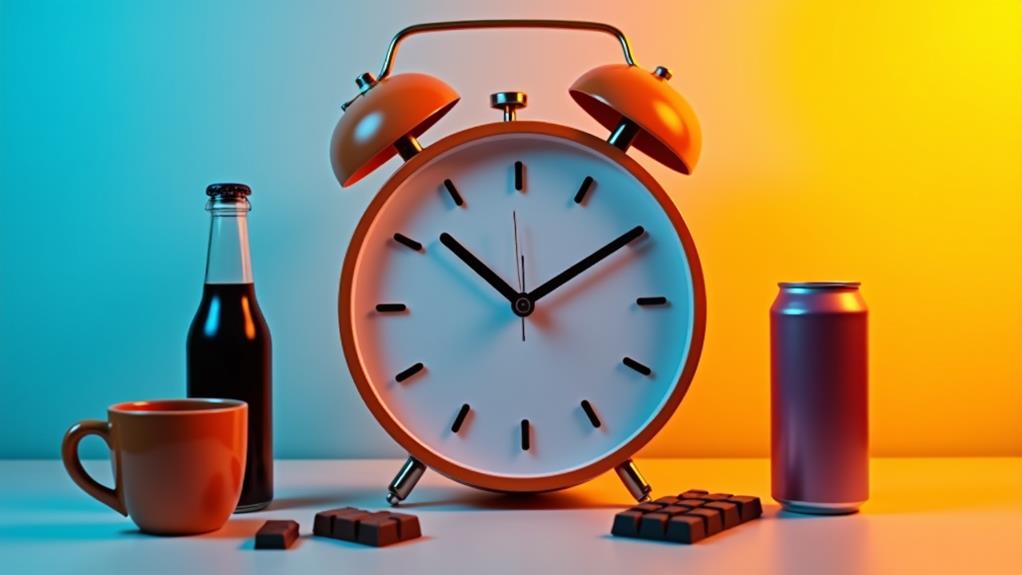
When it comes to caffeine sources, coffee stands out from the crowd. As a coffee expert, I’ve gotta say it’s my go-to for that morning jolt.
But how does it stack up against other caffeine-packed options?
Let’s break it down:
- Kick-in time: Coffee typically takes 15-45 minutes to hit, peaking around 30-60 minutes.
- Caffeine content: An average cup packs about 95mg of caffeine, while tea only has 30-50mg.
- Absorption speed: Liquid caffeine sources like coffee get into your system faster than solid forms.
- Individual response: Your body’s reaction can vary based on metabolism and tolerance.
Energy drinks often pack a bigger punch, with higher caffeine concentrations that can kick in quicker.
But coffee’s still king in my book. It’s got that perfect balance of caffeine content and absorption rate.
Frequently Asked Questions
How Long Does Coffee Take to Have Effect?
Coffee usually kicks in within 15 to 45 minutes, but it depends on your metabolism. Some folks feel it faster than others. So, it’s not the same for everyone—pretty hit or miss!
How Long Does It Take to Kick Coffee?
It takes about 24 to 48 hours for coffee to clear out, but if you’re sensitive to caffeine, you might feel it wear off sooner. Everyone’s different, so it varies person to person!
How Long Does It Take for Coffee to Stimulate?
Coffee kicks in fast—usually within 15 minutes. You’ll feel the full jolt after 30 to 60 minutes, depending on your metabolism and what’s in your stomach.
What Is the 90 Minute Coffee Rule?
The 90-minute coffee rule? Simple—I down my coffee 90 minutes before a big task for max impact. Timing can vary based on your caffeine sensitivity, but it’s my sweet spot for peak focus.
In Conclusion
I’ve been brewing coffee for years, and let me tell ya, timing your caffeine kick is an art. Remember, it’s not just about the beans – your body’s in on this too. Play around with when you sip to find your sweet spot. And hey, if you’re not feeling it right away, don’t sweat it. Your perfect brew moment is out there. Keep experimenting, and you’ll nail that ideal coffee buzz in no time.
References:
- National Coffee Association. “The Science of Caffeine.” https://www.ncausa.org/About-Coffee/The-Science-of-Caffeine
- U.S. Food and Drug Administration. “Spilling the Beans: How Much Caffeine is Too Much?” https://www.fda.gov/consumers/consumer-updates/spilling-beans-how-much-caffeine-too-much
- Institute for Scientific Information on Coffee. “Caffeine and Health.” https://www.coffeeandhealth.org/topic-overview/caffeine-and-health/
- American Heart Association. “Caffeine and Heart Disease.” https://www.heart.org/en/healthy-living/healthy-eating/eat-smart/nutrition-basics/caffeine-and-heart-disease
- Journal of Food Science. “Caffeine (1, 3, 7‐trimethylxanthine) in Foods: A Thorough Review on Consumption, Functionality, Safety, and Regulatory Matters.” https://onlinelibrary.wiley.com/doi/full/10.1111/1750-3841.12534

